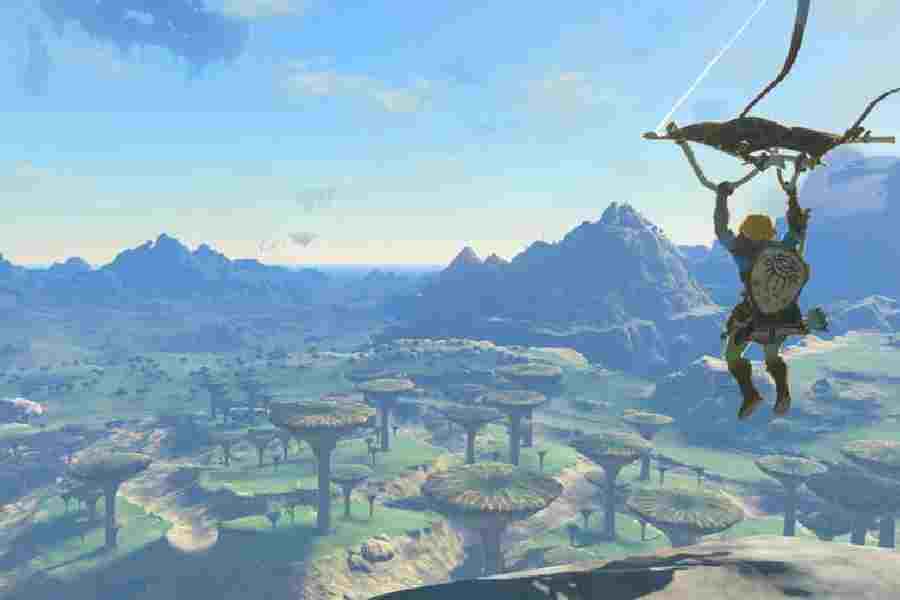Highly anticipated is an understatement for players' feelings about the new game in the "Zelda" series, "The Legend of Zelda: Tears of the Kingdom," which was released on May 12.
Its predecessor, "The Legend of Zelda: Breath of the Wild," released in 2017, sold around 30 million copies worldwide and is considered a masterpiece by gaming critics. Those are some big shoes to fill for the 20th installment in a wildly successful video game series dating back to the 1980s.
In "The Legend of Zelda: Tears of the Kingdom," the player controls the hero Link, who sets out to save Princess Zelda and the kingdom of Hyrule from the villain Ganondorf. All titles in the video game series have this basic storyline in common, but the newest installment has some surprises in store. This time, Link and Zelda begin their adventure side by side.
Deep under the ruins of the dilapidated Hyrule Castle, they discover murals that tell the story of how the kingdom was founded. The so-called Zonai, a god-like species that lived on floating islands in the sky, were apparently involved in this process.
Just an hour into the game, Link is already exploring these islands in the sky, separated from Zelda by an evil demon. He is accompanied by a spirit of the Zonai.
Game elements familiar to anyone having played "Breath of the Wild," such as the temples, are expanded. In the new game, Link needs to solve puzzles there instead of fighting monsters (at least most of the time). He has been given a special cyborg arm that he can use to pick up objects of all kinds, attach them to each other and move them, for example to build bridges or platforms.
The first 60 minutes of the game already promise the familiar and enticing mix of puzzles, fighting and storytelling for which the "Zelda" games are known and loved.
Nintendo success story
The "Zelda" series, developed by Shigeru Miyamoto for Japanese gaming giant Nintendo, has produced a number of classics and repeatedly pushed the boundaries of video games.
The first game was released in 1987 for the original Nintendo console, the NES.
Numerous games followed, among them "The Legend of Zelda: A Link to the Past" (1991/1992) and "The Legend of Zelda: Link's Awakening" (1993) for the Nintendo Game Boy. It remains one of the most influential games worldwide.
Since the 1990s, "Zelda" games have been consistently hailed as the best games of the year.
"The Legend of Zelda: Ocarina of Time," released in 1998, was the first game in the series to feature 3D graphics. It was the first video game ever to receive 40 out of 40 points in Famitsu magazine, the most important Japanese video game publication. It also remains the highest rated game on Metacritic, with a score of 99 out of 100. Numerous video game magazines and critics celebrated it as the best game of all time.
Nintendo also broke new ground with "The Legend of Zelda: The Wind Waker," which was released in 2003 and also received 40 points in Famitsu magazine. Employing cell-shading optics, it is more reminiscent of the artistic style of anime series‘ or graphic novels than of hyperrealistic graphics known from Sony's PlayStation or the Microsoft Xbox.
With "The Legend of Zelda: Breath of the Wild," Nintendo embarked on another experiment. It was the first "Zelda" game to operate according to the "open world" principle. This means that players do not follow a linear storyline, but can freely explore the game world. On their adventures, they take on missions that advance the plot, but can also follow side missions or simply explore the kingdom of Hyrule and get to know its many quirky inhabitants.
Taking the risk of changing a tried-and-tested formula paid off: "Breath of the Wild" also scored 40 out of 40 in Famitsu, 97 out of 100 on Metacritic and won numerous awards. The website IGN even proclaimed it the best game of the decade.
A testament to Japanese culture
Rather than boasting the best visuals or most challenging gameplay, the appeal of the "Zelda" games lies in the fact that they are playable sagas. In Hyrule, mythical creatures blend Japanese and Western mythology.
The narrative is based around a sense of melancholy reminiscent of epic poetry as well as medieval Japanese literature, or even the works of contemporary Japanese writer Haruki Murakami.
As such, the games may well be considered a central piece of Japanese culture. By combining Japanese aesthetics with the European chivalric epic tradition, the "Zelda" games unfold an enticing potential. As a tale of romance and adventure, they revisit a timeless story in a new form: a young knight sets out to save the princess and the kingdom, facing many challenges on the way.
And yet, the games also reflect the zeitgeist. Gender has been fluid in Hyrule since "Ocarina of Time," with women transforming into men or characters not settling on any one gender at all.
The series also reflects other current issues. In "The Wind Waker," the kingdom of Hyrule disappeared under rising sea levels. Ever since "Breath of the Wild," the game has been actively dealing with the issue of the destructive impact of human technology on nature.
Technology also plays a crucial part in "Tears of the Kingdom." The game joins older Japanese pop culture stories about the climate crisis, such as Studio Ghibli films like "Princess Mononoke" (1997) and "Castle in the Sky" (1986).
In "Tears of the Kingdom," however, technology is not the enemy. As opposed to its predecessor, the game gives a central role to human agency, emphasizing that individuals are free to determine how they use technology at their disposal — be it for good, evil or for plenty of fun.
The approach seems to be paying off: IGN is already saying that "Tears of the Kingdom" is making its predecessor look like a first draft, calling it another masterpiece.











